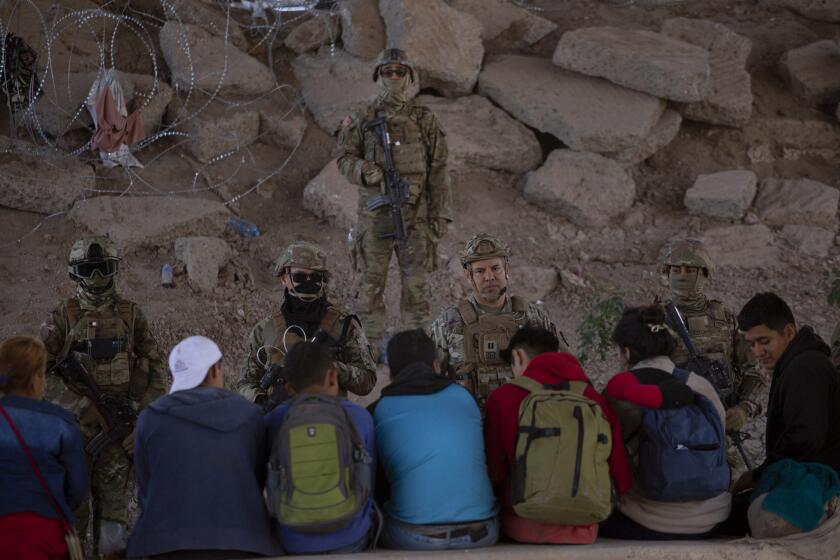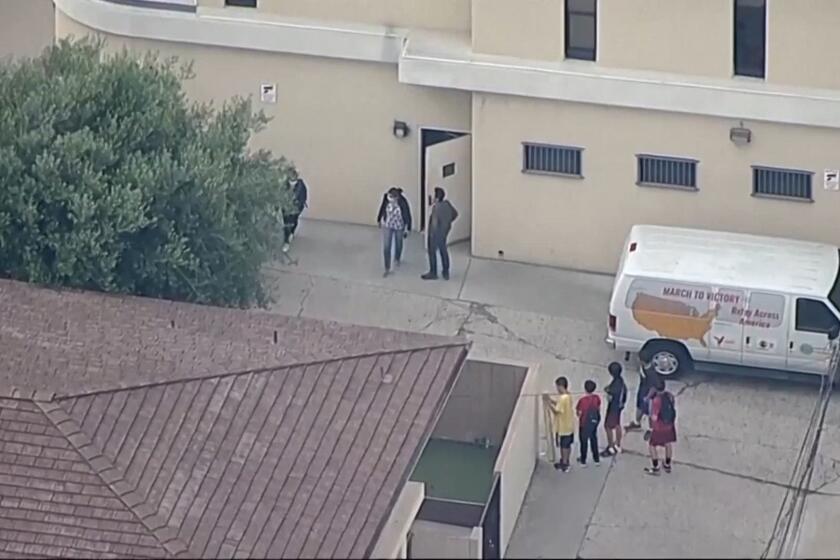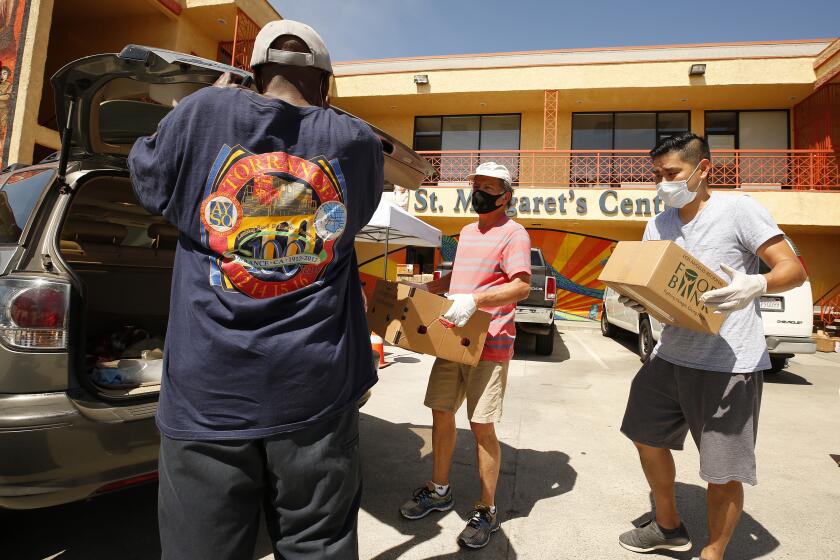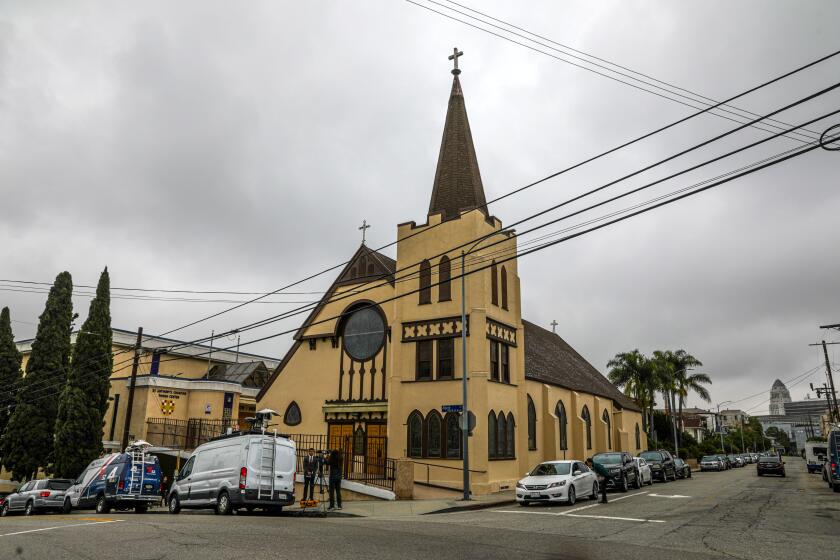Bused from Texas to L.A.: Little food, sketchy bathroom facilities for 20 hours on the road
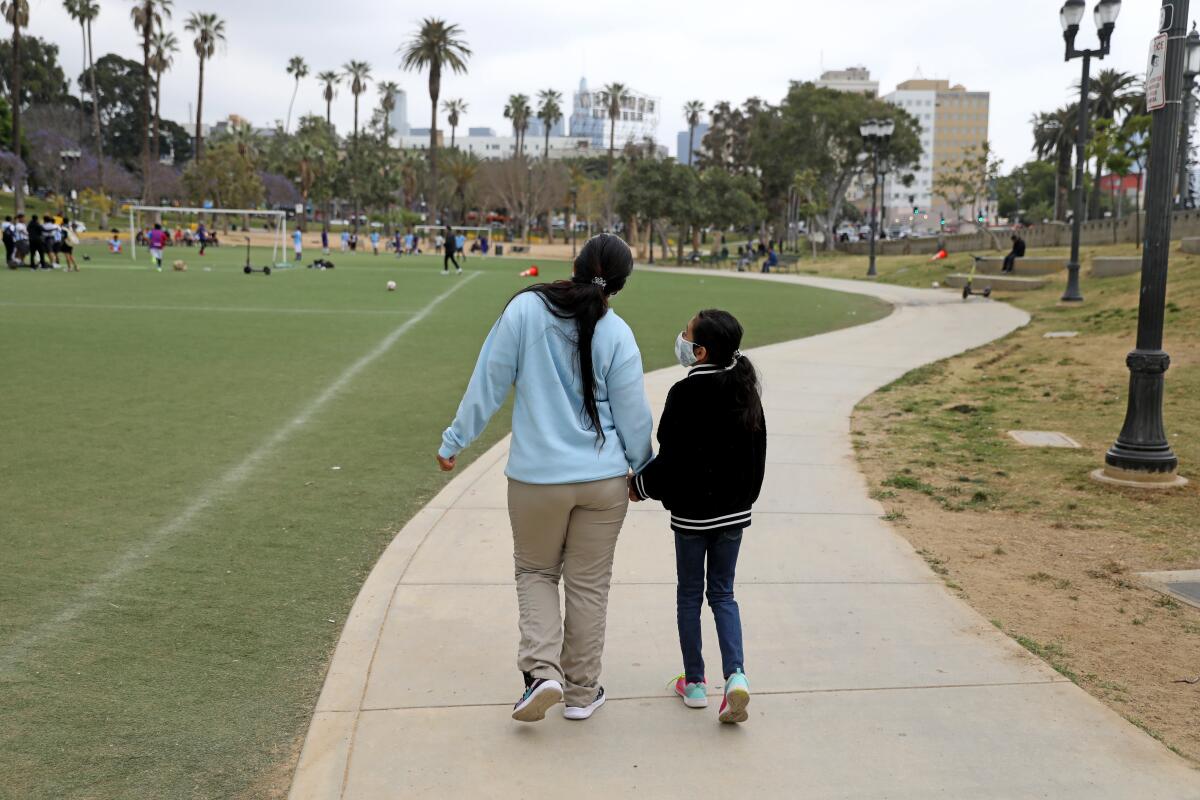
- Share via
As the bus full of migrants prepared to embark June 13 on a more than 20-hour journey from Texas to Los Angeles, the passengers were offered bags of chips, water and energy bars.
Ambar, who asked to be identified by her first name due to privacy concerns, said they were offered their first real meal several hours later. It was military field rations, known as MREs, or meals ready to eat. Her 10-year-old daughter took a couple of bites of packaged lentils and soon after battled a stomachache.
Use of the bathroom on the bus was restricted. Passengers asked the driver to stop so they could use a bathroom at a gas station or fast-food restaurant. But they were told they couldn’t stop until they’d left Texas, Ambar said.
McAllen, where the trip originated, is near the southern tip of the Lone Star State, more than 11 hours from the border with New Mexico.
“The trip was really difficult,” the 28-year-old said. “It felt like it was never ending.”
Ambar and her daughter were among 42 migrants who were bused from McAllen to L.A. in a move Texas Gov. Greg Abbott said would relieve “overwhelmed” border towns “on the front lines of President Biden’s border crisis.”
Texas Gov. Greg Abbott is caught in an increasingly nasty feud with fellow Republicans. So how better to flex political muscle than packing migrants off to California?
Although Ambar raised concerns about the conditions on the bus, many migrants wouldn’t have been able to afford the trip to L.A. otherwise, she said. Among the group was a family of 15 who likely would have had to pay thousands of dollars for transportation on their own, she said.
Ambar agreed to take the trip because she was trying to reach Utah and had been told she could get a cheaper bus from L.A. But she was separated from her husband by federal agents at the border, and she’s unsure what to do next.
“The only thing I’m grateful for is that the bus brought me here, where I could meet such good people,” Ambar said.
More than 22,000 migrants have been transported across the country from Texas, under a plan hastily instituted by Abbott last year. Abbott has used the program to protest Democrats’ policies on immigration, and the state has sent buses to a handful of cities run by Democrats: Washington, New York, Chicago, Philadelphia and, most recently, Denver.
On Tuesday, Abbott’s press secretary, Andrew Mahaleris, said in a statement to the Times that bus is stocked with food and water and makes stops along the trip to refuel and switch drivers. He said migrants “are allowed to purchase any needed provisions or disembark at any of these stops, as they have been processed and released by the federal government.”
“Until President Biden steps up and does his job, Texas will continue busing migrants to sanctuary cities to provide relief to our overwhelmed border towns,” Mahaleris said.
Last week, L.A. City Council members introduced a motion directing the city attorney to investigate whether human trafficking, kidnapping or any other crimes were committed in busing the migrants to L.A.
California Atty. Gen. Rob Bonta has said his office is looking into the conditions by which the migrants were transported to the state.
“I’ve said it before, and I’ll say it again: Human beings should never be used as pawns in a political stunt,” Bonta said in a statement Friday. “California will continue to provide compassion and care to those who arrive in the Golden State.”
Texas Gov. Greg Abbott said Wednesday that migrants had been transported from Texas to Los Angeles and dropped off at Union Station.
On June 4, Ambar and her husband and daughter entered the U.S., seeking asylum. They had been living in Colombia. They were initially detained near Brownsville, Texas, as a family unit. But soon after, Ambar said, officers learned that the couple were in a registered common-law marriage and that he was her daughter’s stepfather.
Ambar said she was told the document issued by the Colombian government recognizing their relationship wasn’t valid. Border Patrol agents separated the couple, leaving the family in tears.
“It hurt us so much,” Ambar said.
Ambar’s husband, who is in the custody of U.S. Immigration and Customs Enforcement, is facing deportation.
Lindsay Toczylowski, an attorney and executive director of the Immigrant Defenders Law Center, said the separation was in violation of a U.S. Customs and Border Protection memo from April stating that the Department of Homeland Security “remains committed to protecting the unity of families encountered at the border to the extent legally and operationally feasible.”
“If that spouse is deported, we now have a mother and child here in the United States who are here to seek asylum, but a member of their family is already being sent back to a place where they aren’t safe,” Toczylowski said. “It just leaves this family in an incredibly difficult situation.”
ICE did not respond to a request for comment on the case.
You can support Los Angeles- and California-based organizations that are helping migrants and refugees with legal services, housing, basic necessities and more.
Within days of being detained, Ambar was released and wound up in McAllen, where she and other migrants were offered free bus rides to other states. The vast majority of Abbott’s buses have left from Del Rio, but last month the program was expanded to Brownsville and McAllen.
Despite the political motivations, immigrant advocates have been surprisingly willing to cooperate with the program.
Tiffany Burrow is the director of operations for the Val Verde Border Humanitarian Coalition in Del Rio. For years, her organization has struggled to help migrants book travel out of the border town. When Abbott announced that he would send migrants for free on buses to the East Coast, Burrow saw it as a potential opportunity to help those trying to reach Washington and other cities.
Soon after the program began, Burrow rode one of the buses to D.C. along with a group of migrants to see if her organization could, in good faith, take part.
Burrow said the conditions were basic — with long distances between rest stops and MREs to eat. But the driver and security guard (there’s at least one on each bus) were respectful, and she decided that the conditions were acceptable.
She has since run orientations for migrants in Del Rio, explaining the busing program in detail and advising them on whether a trip to D.C., New York or another major city would bring them close to their final destination.
Officials with the Texas Division of Emergency Management, which runs the busing program, have defended the conditions on board, explaining that programs in recent years to bus evacuees out of Texas hurricane zones have been run more or less identically.
Sister Norma Pimentel, executive director of Catholic Charities of the Rio Grande Valley, informs migrants that the busing program is voluntary and that they’re not required to go, according to McAllen city spokeswoman Xochitl Mora.
“If an immigrant says, ‘Yes, I want to get on that bus that’s going to that location,’ then Sister Norma will first vet that immigrant to make sure they have a family member or friend who will receive them in that town before allowing them on the bus,” Mora said.
Ambar said that in McAllen, she was offered a spot on a bus to New York, but her husband’s contact lives in Utah.
“I went to a different city, because I hoped to find the help to get a lawyer to help my husband, but I didn’t know what was going to happen,” she said. “I didn’t know what the situation would be.”
They began the process to leave, which included signing a form saying they were taking the bus voluntarily, around 11 a.m. on June 13. Ambar estimates that the bus didn’t depart McAllen until 4 p.m.
The group went without lunch that day, Ambar said, and weren’t offered a meal until 8 p.m.
Along the way, Ambar’s daughter got dizzy twice and felt nauseous. Ambar said she tried to take two empty bus seats so the girl could sleep more comfortably, but the guard scolded her and said they had to remain in their seats.
At one point, an older migrant on the bus complained to the guard about their treatment.
“You’re treating us like we’re illegals, and we’re not illegal,” he said, according to Ambar. “You’re yelling at us and treating us badly.”
“No, I’m not,” the guard responded. “I’m just telling you what you can and can’t do.”
The passengers were a few hours from California when they were told they could disembark to buy food and go to the bathroom, but it would only delay their arrival. As a result, only a handful got off the bus, including Ambar, whose daughter had diarrhea from the food.
In a statement on Tuesday, Seth Christensen, with the Texas Division of Emergency Management, said “claims about busses involved in Texas border bus missions not having food or water on-board are false.”
According to Christensen, before departing Texas, the NGO in McAllen provided a bag lunch to all passengers. He added that an MRE Package (consisting of 3 meals) and two bottles of water were left on each seat on the bus prior to boarding.
When the bus pulled into Union Station around 4:30 p.m. on Wednesday, organizers were waiting. They said they could help connect the passengers with their families and offered assistance from attorneys.
The third group of migrants sent to California in transportation chartered by state governments in Texas and Florida arrived Wednesday bringing along with it continued controversy.
At a welcome center set up at St. Anthony’s Croatian Catholic Church, the migrants were offered water, juice and sandwiches.
“The truth is, I thanked God when we met all the organizations here who greeted us,” Ambar said. “I came here to this place waiting to see what I could do, without expecting God to really respond and to put such kind people in our path.”
Each person who arrived on the bus has been connected with friends or family, received support services or has continued to another destination in California, according to the office of L.A. Mayor Karen Bass.
Ambar is staying in L.A. for now, and Toczylowski is working to have her husband released.
On Sunday, Ambar spoke to him by phone to wish him a happy Father’s Day.
“Our dream is to be here together,” she said. “The three of us.”
More to Read
Sign up for Essential California
The most important California stories and recommendations in your inbox every morning.
You may occasionally receive promotional content from the Los Angeles Times.
